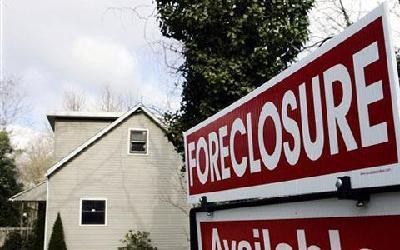
STEVE EMBER: Welcome to THE MAKING OF A NATION -- American history in VOA Special English. I'm Steve Ember. This week, our series brings us to the events of 2008. It was a year that combined one of the nation's worst financial crises with one of its most exciting elections in recent history.
(MUSIC)
In 2006 and 2007, the American housing market began to collapse. Home values had been going up and up. Now the balloon burst.
People started losing homes they had bought with money borrowed on easy credit terms -- loans they were then unable to repay.
The hope was that the crisis in the housing market could be contained, and that it would not spread to the wider economy.
Traditionally, local banks would have suffered the losses on the bad loans. But times had changed. Big investment banks had been buying those loans. The investment banks then resold them as securities offering high returns.
Credit rating agencies working for the investment banks had told investors that the securities were safe. Selling a financial product based on a large group of loans was supposed to limit the risk if a few loans went bad. That was the idea. But that was before millions of homeowners stopped paying their mortgage loans.
(MUSIC)
Mortgage-backed securities became known as toxic assets. No one wanted to be anywhere near them.

In March of 2008, Bear Stearns became the first investment bank to fail as a result of the crisis. Others followed.
In September, Lehman Brothers, the nation's fourth-largest investment bank, sought protection in bankruptcy court. Its failure only deepened the fears in credit markets.
Toward the end of 2008, an international credit freeze developed. No one wanted to take the risk of lending money to banks or other companies that might have owned toxic assets. Some people feared that there could even be a global depression, the first since the 1930s.
The United States economy -- the world's largest -- started shrinking at the end of 2007. The unemployment rate started rising.
President George W. Bush's administration, Congress and the central bank, the Federal Reserve, took extraordinary steps to deal with the growing financial crisis. Their efforts included loans to banks, automakers and other companies. The aim was to rescue businesses that officials considered "too big to fail."
The bailouts from Washington were a decision that not all of the American people agreed with. But the people also had to make a decision of their own in 2008. It was a presidential election year, and the candidates were some of the most diverse in the nation's history.
The Republican Party nominated Arizona Senator John McCain. At 72, he would have taken office as the nation's oldest first-term president.
JOHN MCCAIN: "So stand up with me, my friends, stand up and fight for America, for her strength, her ideals and her future. The contest begins tonight!"
(MUSIC)
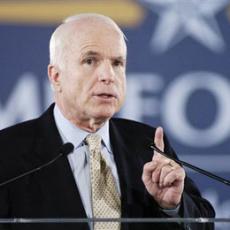
John McCain had been a Navy pilot during the Vietnam War. In 1967, the North Vietnamese shot down his plane and took him prisoner. He was tortured and held for more than five years. He returned home a hero.
During the presidential campaign, he spoke often about his experience as a prisoner of war. His campaign message was, "Country First." Senator McCain quickly secured the Republican nomination to succeed George W. Bush.
The Democrats needed more time to choose a nominee. The race settled on two leading candidates. One of them was Hillary Clinton. Her husband was former president Bill Clinton. They spent eight years living in the White House. As first lady she held an unusually public role in her husband's administration. Later she was twice elected as a senator from New York. Now she was trying to return to the White House -- this time as the first woman president of the United States.
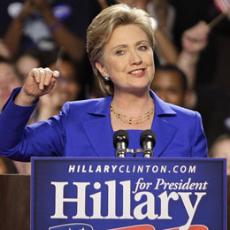
HILLARY CLINTON: "So if you want a winner who knows how to take them on, I'm your girl!"
The other leading candidate for the Democratic Party's nomination would also make history if elected. He was a first-term United States senator from Illinois named Barack Obama. He was born in Hawaii to a white mother from Kansas and a black father from Kenya. If he won, he would be America's first black president.
Blacks in the United States had been slaves until 1863. They were not permitted to vote until 1870. Women in the United States did not have a constitutional right to vote until 1920. And not until the 1960s did federal civil rights laws bar discrimination against either group.
(MUSIC)
During the nominating fight between Hillary Clinton and Barack Obama, there was a lot of discussion and debate in America about gender and race. Some talked about the problems that women still faced in society, and wondered whether Americans could accept a woman as president. Others talked about the problems that blacks still faced in society, and wondered whether Americans could accept a black man as president.
PEOPLE: "I think we're ready. Oh, I hope we're ready." "I just hear people's comments that that will be the day when we have a black man running our country." "I'm not sure. I'm really not sure."
Candidate Obama gave a speech about race in America.
BARACK OBAMA: "I am the son of a black man from Kenya and a white woman from Kansas. I was raised with the help of a white grandfather who survived a Depression to serve in Patton's Army during World War II and a white grandmother who worked on a bomber assembly line at Fort Leavenworth while he was overseas.
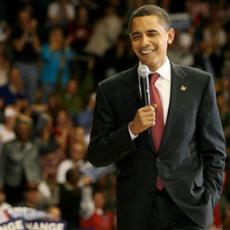
"I've gone to some of the best schools in America and lived in one of the world's poorest nations. I am married to a black American who carries within her the blood of slaves and slave owners - an inheritance we pass on to our two precious daughters."
"I have brothers, sisters, nieces, nephews, uncles and cousins, of every race and every hue, scattered across three continents, and for as long as I live, I will never forget that in no other country on Earth is my story even possible."
"It's a story that hasn't made me the most conventional of candidates. But it is a story that has seared into my genetic makeup the idea that this nation is more than the sum of its parts - that out of many, we are truly one."
Many political experts predicted that Barack Obama would lose the nomination. For one thing, he was still new to many Americans while almost everyone knew who Hillary Clinton was. Also, she had many wealthy supporters donating to her campaign. But political scientist Larry Sabato at the University of Virginia said those experts did not understand the country's mood.
LARRY SABATO: "They underestimated the power not just of Barack Obama, but also the yearning for change and the antipathy toward dynasty -- the idea that the Bushes and Clintons would essentially control the presidency from 1988 to potentially 2016."
(MUSIC)
"Hope" and "Change" became the messages of the Obama campaign. Barack Obama won enough delegates to secure his party's nomination, which he accepted in August, shortly after his 47th birthday. His choice for vice president was Joe Biden, a longtime senator from Delaware.
But Mr. Obama's nomination was not the biggest news story for long. The next day, John McCain had a big announcement of his own. His running mate would be Sarah Palin. The Democrats had once nominated a woman for vice president, Geraldine Ferraro, but never the Republicans. Neither party had ever nominated a woman for president.
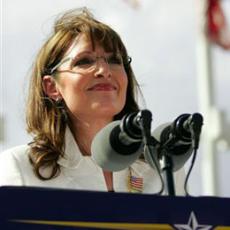
Sarah Palin was the 44-year-old governor of Alaska. Few Americans had ever heard of her until she spoke at the Republican nominating convention. She referred to herself as a "hockey mom."
SARAH PALIN: "I love those hockey moms. You know, they say the difference between a hockey mom and a pit bull. Lipstick."
Some women said they admired her ability to balance work and family as the mother of five children.
ANGEL VOGGENREITER: "I feel like she really speaks for me and represents me."
(MUSIC)
During the campaign, Barack Obama raised a record amount of money for a candidate -- about 745 million dollars. He became the first candidate to reject the modern system of public financing of presidential elections. Instead, he accepted smaller contributions from hundreds of thousands of supporters. His campaign made extensive use of the Internet to collect donations, connect with voters and organize volunteers.
John McCain did not have as much money to spend. Something else also set him apart from the Democratic nominee. John McCain supported the wars in Iraq and Afghanistan. Barack Obama said he would bring the troops home from Iraq within two years of becoming president. But the top issue in the campaign was the economy. Again, Larry Sabato at the University of Virginia:
LARRY SABATO: "The fundamental issue in most presidential elections is the economy. It really is the economy, stupid - the old slogan from the 1992 Clinton campaign. When an administration has a positive, strong economy, they're tough to beat -- even if it's a non-incumbent running. But when the economy turns sour, they're halfway out the door."
Barack Obama and John McCain agreed on at least one thing in dealing with the economy. They both supported President Bush's call for the government to bail out the financial industry. Many Americans disliked the idea of helping banks that had acted irresponsibly. But Congress agreed to let the government buy bad loans from banks and temporarily became part-owner of some rescued companies. Supporters argued that the bailouts were needed to save the economy from collapse.
(MUSIC)
In November of 2008, Americans elected Barack Hussein Obama as their 44th president. He received 53 percent of the popular vote. He won some states that had not chosen a Democrat in many years. A little more than 60 percent of voting-age Americans cast their ballots, the highest percentage since 1964. Support for Mr. Obama was especially strong among young people and African-Americans. Many voters were emotional on election night.
CALIFORNIA VOTER: "I'm speechless. I'm trying not to cry right now. I'm thinking of my great-grandfather, my grandmother. Man, this is amazing."
BARACK OBAMA: "Because of what we did on this day, in this election, at this defining moment, change has come to America."
But the election of 2008 was not the end of America's economic problems. What became known as the Great Recession would officially end in June of 2009, six months into the new president's term. But its lasting effects would continue to be felt all the way into the 2012 election season.
(MUSIC)
And that brings our history series to a close. We will start over again. But over the next several weeks, we'll be presenting a special "best of" series. Each program will be a time capsule of life in America from the decades between the two world wars through the end of the 20th century.
We'll look at social trends, the arts, music and other areas of popular culture. We hope you'll join us for this special series, before we begin our new series of programs. You can find all of our programs online at voaspecialenglish.com.
And now, this is your producer and host Steve Ember, thanking our editor Avi Arditti and this week's writer, Kelly Nuxoll – and you for joining us each week for THE MAKING OF A NATION -- American history in VOA Special English.
American history: hurricane Katrina, Iraq and the Great Recession
American history: George W. Bush re-elected
American history: George W. Bush's first term
American history: life in the US after the 9/11 attacks
(來源:VOA 編輯:旭燕)
